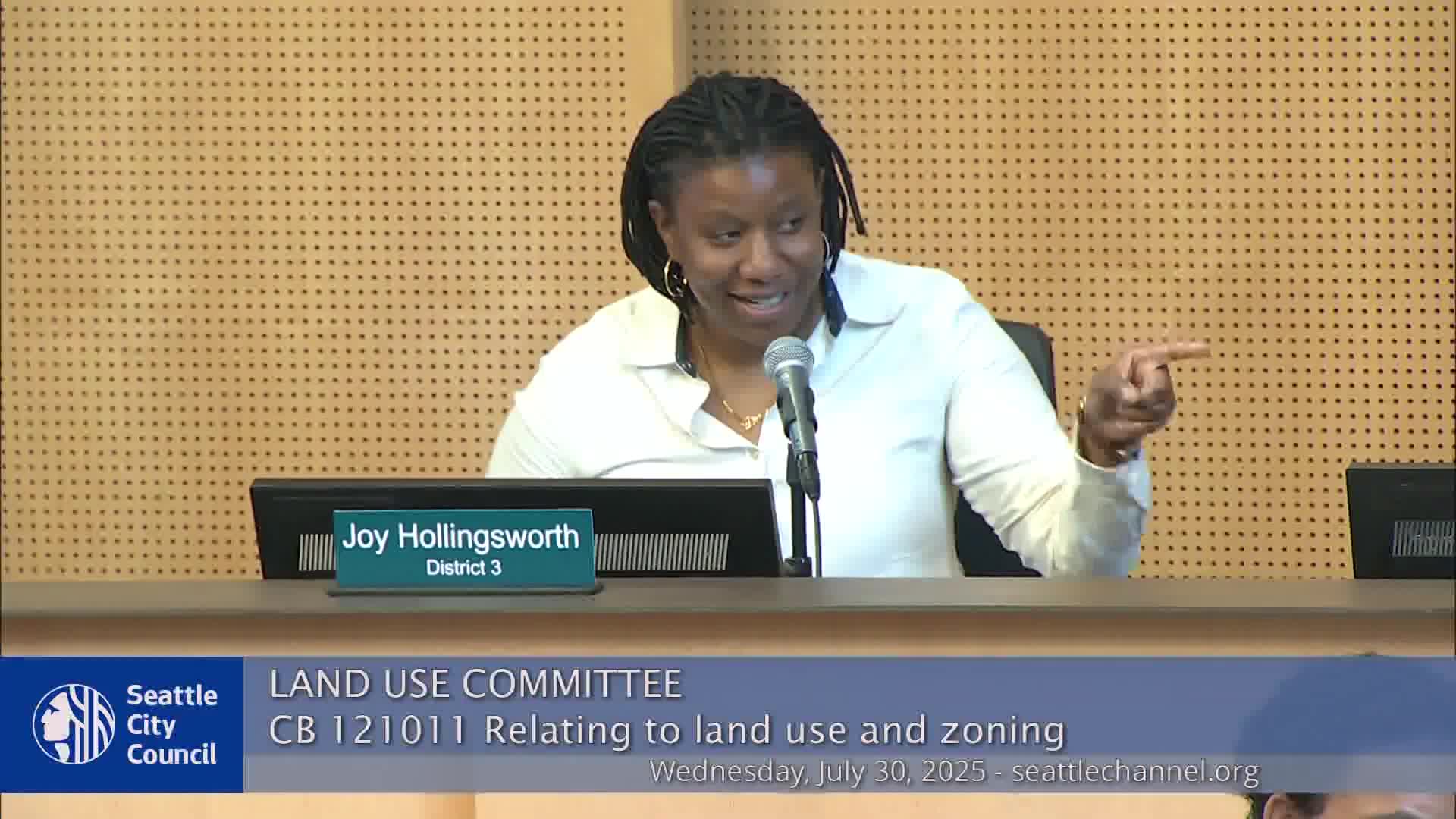Seattle Council Discusses Historical Housing Inequities and Community Development Strategies
July 31, 2025 | Seattle, King County, Washington
This article was created by AI summarizing key points discussed. AI makes mistakes, so for full details and context, please refer to the video of the full meeting. Please report any errors so we can fix them. Report an error »

In the heart of Seattle's city hall, a gathering of council members engaged in a spirited discussion about the future of land use and housing in the city. The meeting, held on July 30, 2025, highlighted the ongoing struggle to address historical injustices in housing while navigating the urgent need for more affordable units.
Council member Juarez opened the dialogue by reflecting on the painful legacy of redlining and restrictive covenants that have shaped Seattle's neighborhoods. She emphasized the importance of acknowledging this history as the city grapples with its current housing crisis. "We have to grapple with that history and just be honest about it," she stated, urging her colleagues to recognize the impact of past policies on today's housing landscape.
The conversation quickly turned to the proposed changes under the Mandatory Housing Affordability (MHA) and Housing Affordability and Livability Agenda (HALA). Council member Morris echoed Juarez's sentiments, noting that the city must confront the realities of zoning laws that have historically excluded certain communities. "Single-family zoning is basically an archaic term from the past," he remarked, calling for a reevaluation of these outdated policies to create a more inclusive city.
As the discussion unfolded, council members expressed their appreciation for the central staff's efforts in articulating complex ideas, making it clear that collaboration is key to moving forward. Council member Hollingsworth acknowledged the hard work of the staff, stating, "They do make us look smart. They make our jobs a lot easier."
However, not all voices were in agreement. Council member Rivera raised concerns about the timing of the proposed changes, suggesting that they should be integrated into the broader comprehensive plan discussions rather than treated as isolated issues. "When we do these things as almost like one-offs or outside of the process, it creates this difficult situation for constituents," she cautioned, emphasizing the need for a holistic approach to zoning and development.
The urgency of the housing crisis was palpable, with council members recognizing that the city needs more housing at various income levels across all neighborhoods. Juarez pointed out that the need for affordable housing is not just a matter of policy but a moral imperative. "We are really addressing the housing problem we're having right now in the city of Seattle," she asserted.
As the meeting drew to a close, the council members left with a renewed commitment to tackle the complex issues surrounding land use and housing. The discussions underscored the delicate balance between honoring the past and forging a path toward a more equitable future. With the stakes high and the clock ticking, Seattle's leaders are poised to make decisions that will shape the city's landscape for generations to come.
Council member Juarez opened the dialogue by reflecting on the painful legacy of redlining and restrictive covenants that have shaped Seattle's neighborhoods. She emphasized the importance of acknowledging this history as the city grapples with its current housing crisis. "We have to grapple with that history and just be honest about it," she stated, urging her colleagues to recognize the impact of past policies on today's housing landscape.
The conversation quickly turned to the proposed changes under the Mandatory Housing Affordability (MHA) and Housing Affordability and Livability Agenda (HALA). Council member Morris echoed Juarez's sentiments, noting that the city must confront the realities of zoning laws that have historically excluded certain communities. "Single-family zoning is basically an archaic term from the past," he remarked, calling for a reevaluation of these outdated policies to create a more inclusive city.
As the discussion unfolded, council members expressed their appreciation for the central staff's efforts in articulating complex ideas, making it clear that collaboration is key to moving forward. Council member Hollingsworth acknowledged the hard work of the staff, stating, "They do make us look smart. They make our jobs a lot easier."
However, not all voices were in agreement. Council member Rivera raised concerns about the timing of the proposed changes, suggesting that they should be integrated into the broader comprehensive plan discussions rather than treated as isolated issues. "When we do these things as almost like one-offs or outside of the process, it creates this difficult situation for constituents," she cautioned, emphasizing the need for a holistic approach to zoning and development.
The urgency of the housing crisis was palpable, with council members recognizing that the city needs more housing at various income levels across all neighborhoods. Juarez pointed out that the need for affordable housing is not just a matter of policy but a moral imperative. "We are really addressing the housing problem we're having right now in the city of Seattle," she asserted.
As the meeting drew to a close, the council members left with a renewed commitment to tackle the complex issues surrounding land use and housing. The discussions underscored the delicate balance between honoring the past and forging a path toward a more equitable future. With the stakes high and the clock ticking, Seattle's leaders are poised to make decisions that will shape the city's landscape for generations to come.
View full meeting
This article is based on a recent meeting—watch the full video and explore the complete transcript for deeper insights into the discussion.
View full meeting
